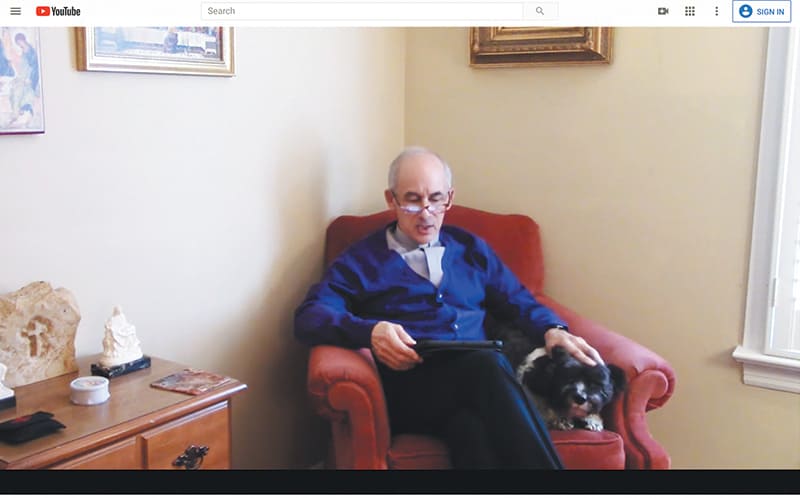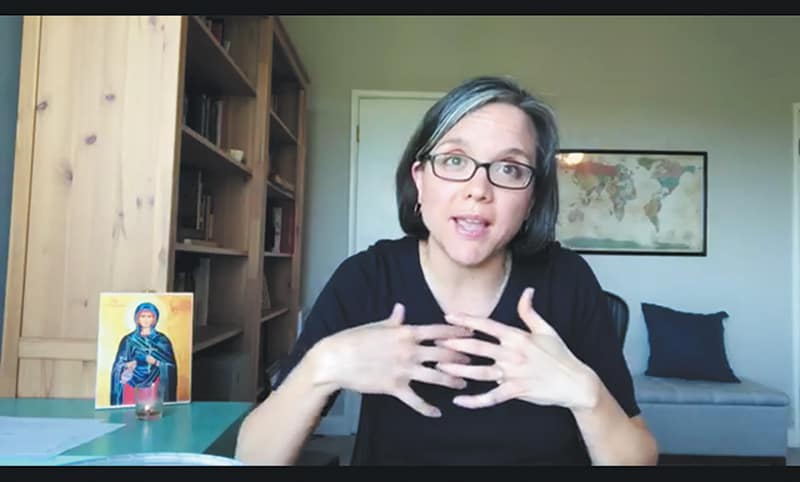
Several months ago, when Deacon Mike Catalano of St. Henry Church in Nashville proposed his master’s thesis topic of “How the use of the internet both hinders and aids the spiritual transformation of 21st century Christians,” he didn’t realize that he would soon be participating in an intensive and necessary effort to engage the faithful and meet their spiritual needs online.
“The internet has been a lifeboat,” Deacon Catalano said, appropriately enough, during an online video chat interview. “It’s kept us together.”
In his thesis proposal, Deacon Catalano notes how technology can be “an immense distraction in daily life,” and how it makes us less able “to simply sit still and devote time in solitude with God.”
But he also acknowledges how “being connected to the internet provides an immense resource for people,” and that is exactly what he is learning first-hand right now.
At this time of social distancing when the parish community can’t be physically present with each other, Deacon Catalano has moved several community prayer opportunities online, including weekly bible study and Lectio Divina groups. He has also facilitated a Cursillo discussion group, held baptism preparation classes and spiritual direction sessions online, and posted videos of himself on YouTube reading bible stories for children.
“I’m very grateful for these groups,” said St. Henry parishioner Deb Cliffel, who participates in Deacon Catalano’s bible study group and a small faith-sharing group online. “I do it for the spiritual nourishment.”
In her smaller faith sharing group chat, “it’s nice to share your faith, your hope. If you’re feeling down, you meet with the group, and you think, ‘I can get through the rest of the week,’” Cliffel said. “It’s uplifting.”
Longtime St. Henry parishioner and Lectio Divina prayer group member Marge O’Neill was also thankful for having the regular sessions online.
“We read the readings for the next Sunday, meditate on it, and share a word or passage that had meaning to us,” she said. “I get a lot of insight from hearing what word or passage was meaningful for other people.”
Although the group is not together, they can see each other’s faces on the computer screen, O’Neill said. “It’s almost like being there.”
Deacon Catalano ministers to a wide range of parishioners online, and has been pleasantly surprised that even older parishioners, including those in their 80s and not tech-savvy, have been able to join in.
“They have been persistent in doing what they need to do to get online on a regular basis,” he said. “Watching Mass online is easy, but it takes some effort to connect to Go To Meeting,” the platform he uses for bible study.
‘As interactive as we can’
The Diocese of Nashville’s Office of Faith Formation has also been making new efforts to engage the faithful online right now. Director Joan Watson has been leading a live online bible study class through Facebook on Tuesdays and Thursdays at 2 p.m., and she continues to release a new Three Minute Theology video every Tuesday.
“I want to keep as much as I can the same,” said Watson.

Even though her team can’t come together to record new videos right now, “through the miracles of technology,” Watson is recording them at home and sending them to producer Angie Bosio to edit, then they are presented the same as always, posted on YouTube and the Diocese of Nashville’s Facebook page.
Watson is also asking the question, “How do we do what we’ve always done but in a new way?” For example, with the bible study, because people aren’t physically together and can’t raise their hands to ask a question, Watson’s assistant Kristina Shaw monitors the questions and comments people post so Watson can respond at the end of the session. “We want to be as interactive as we can,” she said.
During Holy Week, Watson assisted Bishop J. Mark Spalding with livestreaming the liturgies from the Cathedral of the Incarnation. “We’ve gotten a really, really good response” to all the recent digital efforts, she said.
At this uncertain time, “there’s a desire to deepen our own spiritual lives, and feel connected with the Church,” Watson said.
A number of parishes around the Diocese of Nashville have stepped up their digital faith sharing efforts, Watson said.
Mike Porter, a parishioner at St. Stephen Catholic Community in Old Hickory, and his wife Sandra have used the internet to stay connected to their parish. They have been watching Sunday Masses livestreamed from their church and have joined a group on a video conference to pray the Rosary on Monday nights, organized by Deacon Fred Bourland and Chip Harris, the Deputy Grand Knight of Knights of Columbus Council 9282 at St. Stephen.
St. Stephen is also continuing religious education classes and Life Teen meetings online.
Holy Family Parish in Brentwood is making similar efforts, Watson said.
‘Real desire to be connected’
As Deacon Catalano researches his thesis to earn his masters degree in theology from St. Meinrad Seminary and School of Theology, and experiments with “how parish leaders can navigate the use of the internet to help their parishioners,” he will stay busy using technology to nourish his faith community.
Whether he’s managing a group discussion of 20 people in an online bible study group or sitting in silence during an online centering prayer workshop, Deacon Catalano has witnessed the benefits of having these spiritually nourishing, shared digital moments. “There’s a real desire to be connected,” he said.
Cliffel, who is part of Deacon Catalano’s bible study group, sees the value of continuing the online faith groups, even after parish groups are able to meet in person again. It offers more flexibility for people who have a hard time getting out, and for those whose work schedules don’t allow them to be physically present at the group meeting time.
“I want to do this moving forward … meeting online for community and fellowship,” she said.
Right now, “we’re looking at new and creative ways to stay connected,” Deacon Catalano said, and he’s unsure exactly what all the digital faith sharing efforts might look like once social distancing restrictions are lifted.
“Once the pandemic has subsided,” he said, “digitally mediated prayer can be an aid and can help us, but it can never be a substitute for physical interaction.”
Andy Telli contributed to this report.









